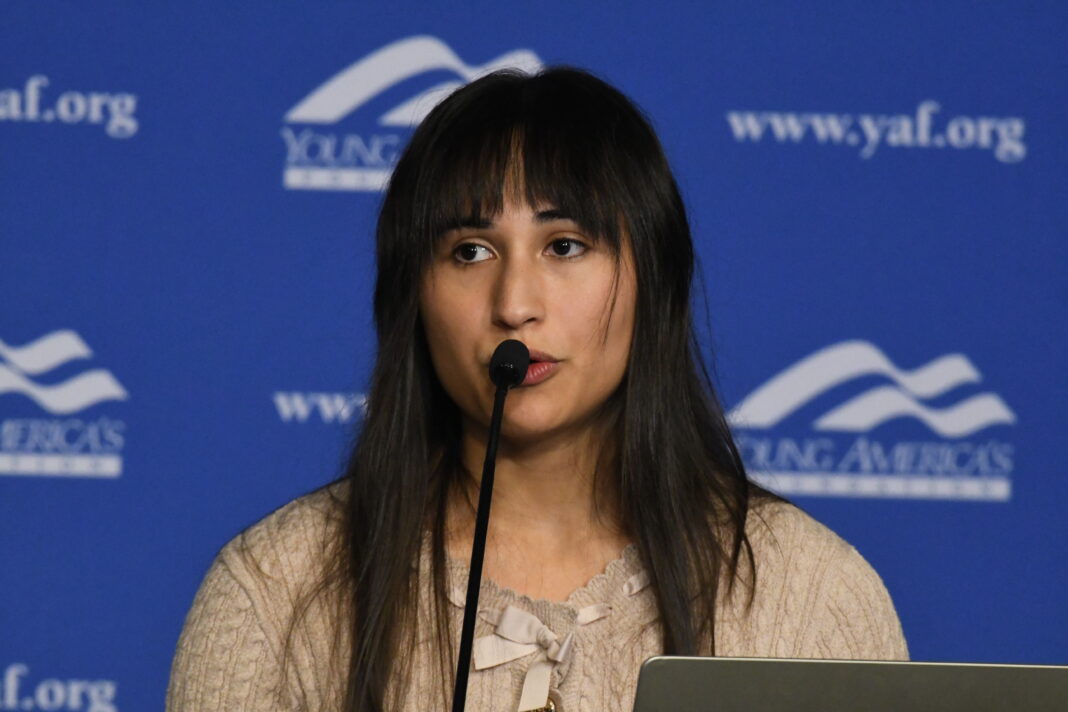The national face of the detransitioner movement addressed a full room of more than 150 people on Monday night at the University of Iowa. Chloe Cole, 19, told her story about gender dysphoria, transition and detransition, warning about the dangers of experimental treatments taking place on children across the country in states where kids are not protected. The event was hosted by the Young Americans for Freedom — University of Iowa chapter.
Cole described how what happened to her was obviously a major part of her childhood but is also leading to a border disruption to the culture.
Growing up, Cole said she had a tomboy streak and related more to her older brothers, her father and her male peers than she did her sisters, her mom and her female peers. She hit puberty at a young age and felt like she was being thrust into adulthood as a child. She said the messaging she was receiving around felinity and womanhood in general was “very disruptive” to her view of a woman.
“I felt like a lot of my value as a woman would come from frivolous things like the way I presented myself, or the way I looked or my sexuality rather than the content of my character,” Cole said. “There were times were I felt as though I would just be happier if I were a boy.”
She said she had feelings plenty of other girls experienced growing up, but she lacked guidance. She was exposed to the transgender community at 12 years old when she got her first phone.
“It was such a novel concept to me at the time,” she said. “Not only because of the community’s broader message of self-acceptance, and a discovery and acceptance of those who are different, but also because of the bright colors and the flags and all of these new terms that I could use to describe myself.”
As a girl who had been bullied, she said it hit close to home.
“I had always wanted to feel that I could be part of a community or I could be accepted,” she added.
That’s when she really started questioning things and began to wonder if things would be better if she were a boy. She came out to her mom and dad in a letter. They were supportive and wanted her to feel secure.
“But they were also unsure about where this was coming from,” Cole said. “I was the youngest of a family of five kids.”
Her parents found her care, thinking it meant psychiatric treatment to help her cope with the feelings. They thought she’d be allowed to be a kid, allowed to grow up and find ways to express herself without permanent interventions.
“They were completely blindsided about what was to happen next,” Cole said.
They hired a therapist as she went from eighth grade into ninth — she was 12 going on 13. At the time, she said she didn’t have a lot of friends and the issues she had included being from a previous diagnosis and medication for ADHD, a body image disorder, a potential eating disorder and being on the autism spectrum.
All of that was ignored, she said.
“They were focusing on what I wanted rather than what me and my family needed,” Cole said. “And it was at our expense. My mom and dad started becoming more and more concerned as I started becoming more distressed.”
Her therapist would affirm whatever Cole called herself and whatever she proclaimed to be her identity.
“But he wasn’t addressing the real issues in my life,” she said. “I felt more and more helpless because I was going to somebody who was supposed to help me and I wasn’t getting any of it.”
The therapist told her parents there was no other choice and that children know their gender identity because it is innate.
“They said it could be life or death. They essentially gave them the ultimatum of either having a very suicidal and very likely dead daughter or a living transgender son,” Cole said. “But I wasn’t suicidal until I was started on these treatments.”
She started on puberty blockers and took those for about a month. It started with a heavy period and then what she called chemically induced menopause. From there it went to crossed hormones.
“I was very lethargic,” she said. “It was a terrible way to live.”
But after beginning testosterone she felt amazing.
“It was a literal steroid that they were starting me on and anything would be preferable to having menopause at 13 years old,” she said.
Her energy was back, she felt confident and she was experiencing the gender euphoria the transgender community talks about. In addition, she experienced a “steep increase” in her sex drive and that was difficult for her to handle.
“It turned me into a hypersexual and made me prone to being groomed by adult men sexually over the course of my adolescence,” she said.
Her voice deepened and her body changed. But she still had breasts. At the time everyone knew her as a girl, so she didn’t really hide them. However, then she was sexually assaulted by a classmate at school.
“Nobody cared or noticed,” she said.
As a guy, she said she thought it would be a sign of weakness to tell anybody about it.
“The only choice I had was to man up,” she said. “And so I did.”
The fear of being taken advantage of sexually as a girl or someone knowing she was a girl remained in the back of her mind and eventually influenced her decision to undergo surgery.
After her sophomore year of high school, she underwent more social changes. She would wear binders to school, but remove them at home every day after school and shower. It led to a deeper depression.
“I clearly was not responding to this treatment I was given,” she said. “In fact, it was making me worse. And yet all the stress I was experiencing was yet again attributed to me having been born in the wrong body. And my mental state at the time was completely ignored even as I was going through complications for surgery. At just 15 years old, I underwent a double mastectomy.”
That was the turning point. The more she tried fitting in as a boy, the less happy she felt.
“It was becoming too much for me,” she said. “But I was so deep into it. I had been on hormones for about two or three years by this point. My voice was so deep. Everybody in my life knew me as a son, as a grandson, a brother, a nephew — a boy named Leo. How could I go back?”
Perhaps, she thought, she was an effeminate boy or nonbinary.
“But I just couldn’t think of going back because I didn’t think there was a way,” she said.
Near the end of her junior year in high school that changed. A psychology class focused on families and childhood psych development and how parenting plays a role in that.
“I had this epiphany,” she said. “A maternal instinct — I wanted to have children of my own, to be a mother, to be a wife. And by undergoing this, I was losing more parts of myself as an adult while I was still a child. It was heartbreaking. I didn’t know how to live with myself after having gone down this path. Eventually, I just couldn’t take it anymore.”
She had no idea what life would look like, but she quit the treatments.
“It was destroying me,” she said.
Detransitioning wasn’t easy either, though. She said she lost “so much” in stopping her transition. For her detransition, there was no guidance. She was mostly alone. Her medical team wouldn’t help. The surgeon refused to help with complications as she suffered open wounds that would leak fluid. She needed to wear bandages over her chest every day.
When she tried to go back to him he dismissed her concerns and told her to put vasoline on it. That led to a skin infection.
“Even socially it was incredibly difficult,” she said. “That shame of having to go back to everybody in my life who was a part of this — especially to my own father and mother and tell them that this was all wrong. I wasn’t Leo, I was Chloe and I was still a girl. It was humiliating. It was shameful.”
Her parents felt “incredible guilt.” But she doesn’t blame them. Instead, Cole said she believes they were coerced into it.
The transgender community considered her a traitor. She lost all of her friends.
“These people who were treating me as if I was second family were now rejecting me,” she said.
They told her not to talk about her regret, that she was a teenager and not a toddler. That it was her fault. And that she should shut up because her experiences didn’t reflect their experience and by talking about it she could harm the transgender community and kids who really do need the interventions.
But then she found the detransition community online. She began to believe it was her responsibility to speak up about what happened and wanted to empower other young women and young kids who shared a similar experience.
At the beginning, she didn’t expect her story to get far. But everything has changed since then. Now her story has helped revolutionize reality. She has also filed a lawsuit against her medical team as well as Kaiser Permanente.
“I want to discourage any other doctor or any adult who feel like they can abuse a child in this way,” she said. “I want to make sure that any adult who does this to another child will be held accountable and those of us who have been affected by this can also get jealous.”
As she finished, she addressed those in the room who didn’t agree with her message.
“I want to say that I am not transphobic,” Cole said. “I do not hate transgender people. As somebody who has been through the transition process and has struggled through gender dysphoria, I know just how difficult it can be.”
She wants to be a voice that helps the transgender community receive the care it truly needs and recognize there isn’t just one path — transition or death.
“We need better care,” she said. “And that doesn’t necessarily mean just affirming what it is that we want, whether it be our preferred gender identity or pronouns or name.”
Instead, they need grace and they need to be listened to about their feelings.
“I hope that in speaking out I can encourage compassion not just to individuals like myself but also toward the transgender community and to foster a more honest, open-ended discussion,” Cole said.
One of the people who asked Cole a question said she understood Cole was treated “really awfully,” but how could Cole stand there and base her lawsuit and advocacy on taking away an option for other kids that she herself took advantage of.
“Frankly medical transition is never appropriate for children,” Cole said. “It is never appropriate to interfere with a perfectly healthy child’s natural course of development — sexually, physically psychologically. There is no biological marker for being transgender. I really don’t believe that there is such a thing as being a transgender kid — being transgender is not an innate thing — it is a choice, and this is an adult choice that will affect pretty much every area of your life.”
No child, she added, should be expected to be able to make such a decision that will impact every part of their future and no adult has any right to do so either.
For her part, Cole believes individuals should have to wait until age 25 to undergo transition treatment. She doesn’t believe something magical happens the day someone turns 18 and someone is completely mature. But the brain tends to be fully developed by about 25 years old and individuals have had time to consider whether they want to have a family and get married.
Cole was also asked what she would say to the protestors who were downstairs in the building.
“To the people downstairs I would tell them they are on the wrong side of history,” she said. “That you cannot side with the systemic abuse of children and mentally ill young adults.
“And to other people who are struggling with gender dysphoria — you are enough. The problem is not the way that you were born or the way that your body is. It’s the way that you feel about it. It’s OK to not always be comfortable. But it’s important to learn to be comfortable with the uncomfortable. You don’t always have to get what you want. It’s important that you make sure that you’re spending time on things that will actually build your identity, not a word you call yourself, the way you dress but the people around you — your family, community and people around you.”















